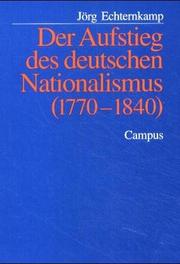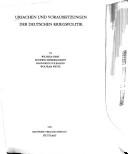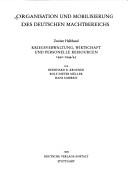| Listing 1 - 10 of 11 | << page >> |
Sort by
|

ISBN: 359335960X 9783593359601 Year: 1998 Publisher: Frankfurt/Main ; New York : Campus,
Abstract | Keywords | Export | Availability | Bookmark
 Loading...
Loading...Choose an application
- Reference Manager
- EndNote
- RefWorks (Direct export to RefWorks)
Nationalism --- History --- Germany --- Politics and government
Book
ISBN: 3110397749 3486858521 Year: 2018 Publisher: Berlin ; Boston : De Gruyter Oldenbourg,
Abstract | Keywords | Export | Availability | Bookmark
 Loading...
Loading...Choose an application
- Reference Manager
- EndNote
- RefWorks (Direct export to RefWorks)
Der Band bietet einen konzisen, problemorientierten Überblick über die wichtigsten Phasen des Dritten Reiches. Im Mittelpunkt stehen die ideologischen Grundlagen, die NS-Herrschaft und die Rolle Hitlers, die Mobilisierung der Gesellschaft und die Ausgrenzung von Minderheiten sowie der nationalsozialistische Krieg. Zudem diskutiert Echternkamp die aktuelle NS-Forschung, die durch die Debatte über die „Volksgemeinschaft“ neue Impulse erhalten hat. The volume presents a concise, problem-oriented overview of the most important phases of the Third Reich. It focuses on ideological underpinnings, Hitler’s role in Nazi rule, social mobilization, the exclusion of minorities, as well as the National Socialist war. In addition, Echternkamp examines contemporary research on Nazism, which has taken on new force with the debate surrounding the Volksgemeinschaft.
World War, 1939-1945. --- Germany --- History --- European War, 1939-1945 --- Second World War, 1939-1945 --- World War 2, 1939-1945 --- World War II, 1939-1945 --- World War Two, 1939-1945 --- WW II (World War, 1939-1945) --- WWII (World War, 1939-1945) --- History, Modern --- Third Reich, 1933-1945

ISBN: 3421019347 3421019355 3421060983 3421062323 3421064997 3421062331 3421055076 9783421062352 3421062366 3421065284 9783421062376 9783421043382 Year: 2004 Publisher: München Deutsche Verlags-Anstalt
Abstract | Keywords | Export | Availability | Bookmark
 Loading...
Loading...Choose an application
- Reference Manager
- EndNote
- RefWorks (Direct export to RefWorks)
World War, 1939-1945 --- Germany --- Third Reich, 1933-1945 --- Military policy. --- Politics and government --- History of Germany and Austria --- anno 1930-1939 --- History --- History of Eastern Europe --- anno 1940-1949 --- Russia --- Aerial operations, German --- Campaigns --- Soviet Union --- Foreign relations

ISBN: 3421062366 Year: 2004 Publisher: München Deutsche Verlags-Anstalt
Abstract | Keywords | Export | Availability | Bookmark
 Loading...
Loading...Choose an application
- Reference Manager
- EndNote
- RefWorks (Direct export to RefWorks)
History of Germany and Austria --- anno 1930-1939 --- anno 1940-1949
Book
ISBN: 3486717227 9783486717228 Year: 2013 Publisher: München De Gruyter
Abstract | Keywords | Export | Availability | Bookmark
 Loading...
Loading...Choose an application
- Reference Manager
- EndNote
- RefWorks (Direct export to RefWorks)
Krieg ist ein globales Phänomen, doch die Kriegserinnerungen und das Gefallenengedenken sind in jedem Land unterschiedlich. In 20 Länderstudien loten die Autoren aus, wie historische Traditionen, religiöse Prägungen und politische Ordnungen sich auf die Erinnerungsmuster des neuzeitlichen Gefallenenkults auswirken. Trotz vieler Unterschiede zwischen den einzelnen Ländern treten zwei Gemeinsamkeiten klar hervor: Alle Gefallenen werden politisch in Dienst genommen, um das eigene Staatswesen mit dem Tod der Soldaten zu legitimieren. Zugleich individualisiert sich in allen Nationalstaaten das Gefallenengedenken, das jeden Soldaten einzeln mit seinem Namen und als gleichberechtigten Teil der Nation darstellt. Nur religiöse und revolutionäre Märtyrerkulte sperren sich gegen diese Egalisierungstendenz.
Memory --- Memorialization. --- War memorials. --- Collective memory. --- Collective remembrance --- Common memory --- Cultural memory --- Emblematic memory --- Historical memory --- National memory --- Public memory --- Social memory --- Social psychology --- Group identity --- National characteristics --- War monuments --- Art and war --- Memorials --- Monuments --- Military parks --- Soldiers' monuments --- Memorialisation --- Retention (Psychology) --- Intellect --- Psychology --- Thought and thinking --- Comprehension --- Executive functions (Neuropsychology) --- Mnemonics --- Perseveration (Psychology) --- Reproduction (Psychology) --- Social aspects. --- Political aspects.
Book
ISBN: 3657773363 Year: 2012 Publisher: Paderborn, Germany : Verlag Ferdinand Schöningh GmbH & Co. KG,
Abstract | Keywords | Export | Availability | Bookmark
 Loading...
Loading...Choose an application
- Reference Manager
- EndNote
- RefWorks (Direct export to RefWorks)
Renommierte Fachwissenschaftler aus Deutschland und Frankreich werfen einen grenzüberschreitenden Blick auf das deutsche und französische Militär der vergangenen anderthalb Jahrhunderte. Sie widmen sich den spezifischen Kontakten der Soldaten beider Seiten mit dem Gegner dreier Kriege (im Kriegsalltag und in der Gefangenschaft) und befassen sich auch mit der vielfältigen militärischen und zivil-militärischen Kooperation zwischen Deutschland und Frankreich. Deutlich wird zudem die Bedeutung der Wahrnehmung der jeweils anderen Seite (z. B. ihrer Militärtheorie oder Wehrverfassung). Methodisch zeigt der Band, welch zusätzlichen Erkenntnisgewinn vergleichs- und verflechtungsgeschichtliche Ansätze für die Militärgeschichte erbringen können.
Book

ISBN: 9783421062376 9783421043382 Year: 2008 Publisher: München Deutsche Verlags-Anstalt
Abstract | Keywords | Export | Availability | Bookmark
 Loading...
Loading...Choose an application
- Reference Manager
- EndNote
- RefWorks (Direct export to RefWorks)
Book

ISBN: 9781789201277 Year: 2019 Publisher: New York Oxford
Abstract | Keywords | Export | Availability | Bookmark
 Loading...
Loading...Choose an application
- Reference Manager
- EndNote
- RefWorks (Direct export to RefWorks)
Book

ISBN: 1845459881 9781845459888 9781845457631 1845457633 Year: 2010 Publisher: New York Oxford
Abstract | Keywords | Export | Availability | Bookmark
 Loading...
Loading...Choose an application
- Reference Manager
- EndNote
- RefWorks (Direct export to RefWorks)
Modern military history, inspired by social and cultural historical approaches, increasingly puts the national histories of the Second World War to the test. New questions and methods are focusing on aspects of war and violence that have long been neglected. What shaped people's experiences and memories? What differences and what similarities existed in Eastern and Western Europe? How did the political framework influence the individual and the collective interpretations of the war? Finally, what are the benefits of Europeanizing the history of the Second World War? Experts from Belgium, Ge
World War, 1939-1945 --- Experience --- Collective memory --- War and society --- Violence --- Violent behavior --- Social psychology --- Society and war --- War --- Sociology --- Civilians in war --- Sociology, Military --- Collective remembrance --- Common memory --- Cultural memory --- Emblematic memory --- Historical memory --- National memory --- Public memory --- Social memory --- Memory --- Group identity --- National characteristics --- Knowledge, Theory of --- Philosophy --- Psychology --- Reality --- Pragmatism --- European War, 1939-1945 --- Second World War, 1939-1945 --- World War 2, 1939-1945 --- World War II, 1939-1945 --- World War Two, 1939-1945 --- WW II (World War, 1939-1945) --- WWII (World War, 1939-1945) --- History, Modern --- Social aspects --- Historiography --- Influence --- History --- Europe --- Council of Europe countries --- Eastern Hemisphere --- Eurasia --- Social conditions
Book

ISBN: 0857452878 9780857452870 9780857452528 0857452525 Year: 2011 Publisher: New York Oxford
Abstract | Keywords | Export | Availability | Bookmark
 Loading...
Loading...Choose an application
- Reference Manager
- EndNote
- RefWorks (Direct export to RefWorks)
The German Empire, its structure, its dynamic development between 1871 and 1918, and its legacy, have been the focus of lively international debate that is showing signs of further intensification as we approach the centenary of the outbreak of World War I. Based on recent work and scholarly arguments about continuities and discontinuities in modern German history from Bismarck to Hitler, well-known experts broadly explore four themes: the positioning of the Bismarckian Empire in the course of German history; the relationships between society, politics and culture in a period o
Imperialism --- Politics and culture --- Social change --- Violence --- Violent behavior --- Social psychology --- Change, Social --- Cultural change --- Cultural transformation --- Societal change --- Socio-cultural change --- Social history --- Social evolution --- Culture --- Culture and politics --- History. --- Colonies --- Political aspects --- Germany --- Alemania --- Ashkenaz --- BRD --- Bu̇gd Naĭramdakh German Uls --- Bundesrepublik Deutschland --- Deutsches Reich --- Deutschland --- Doitsu --- Doitsu Renpō Kyōwakoku --- Federal Republic of Germany --- Federalʹna Respublika Nimechchyny --- FRN --- German Uls --- Germania --- Germanii︠a︡ --- Germanyah --- Gjermani --- Grossdeutsches Reich --- Jirmānīya --- KhBNGU --- Kholboony Bu̇gd Naĭramdakh German Uls --- Nimechchyna --- Repoblika Federalin'i Alemana --- República de Alemania --- República Federal de Alemania --- Republika Federal Alemmana --- Vācijā --- Veĭmarskai︠a︡ Respublika --- Weimar Republic --- Weimarer Republik --- ХБНГУ --- Германия --- جرمانيا --- ドイツ --- ドイツ連邦共和国 --- ドイツ レンポウ キョウワコク --- Germany (East) --- Germany (Territory under Allied occupation, 1945-1955) --- Germany (Territory under Allied occupation, 1945-1955 : British Zone) --- Germany (Territory under Allied occupation, 1945-1955 : French Zone) --- Germany (Territory under Allied occupation, 1945-1955 : Russian Zone) --- Germany (Territory under Allied occupation, 1945-1955 : U.S. Zone) --- Germany (West) --- Holy Roman Empire --- History --- Historiography. --- Foreign relations --- Deguo --- 德国 --- Gėrman --- Герман Улс
| Listing 1 - 10 of 11 | << page >> |
Sort by
|

 Search
Search Feedback
Feedback About UniCat
About UniCat  Help
Help News
News